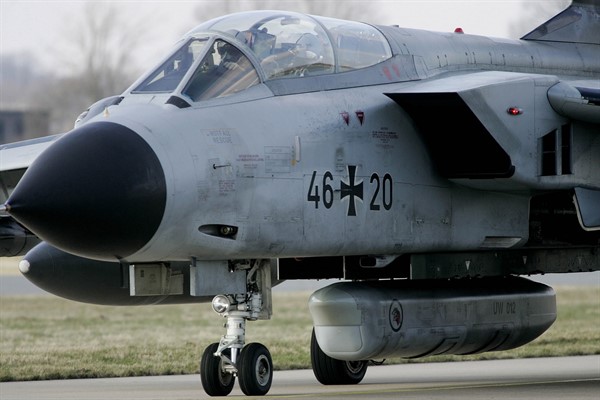Observers in Washington and European capitals who were worried about NATO’s nuclear deterrent breathed a sigh of relief in late November, when the new German governing coalition signaled it would continue Germany’s role in the alliance’s nuclear-sharing agreement. But their reaction was tempered by the uncertainty that still surrounds U.S. President Joe Biden’s upcoming Nuclear Posture Review, which will also have major implications for NATO. Both the United States and Germany have been under strong pressure from other allies, concerned about how Washington’s and Berlin’s choices will affect their security and domestic politics. For now, however, it’s still one down, one to go.
The “Coalition Treaty” released on Nov. 24 by the three parties that make up Germany’s new coalition government, which took office on Dec. 8, included closely watched language concerning Germany’s role in NATO’s nuclear mission. In addition to U.S., U.K. and French strategic nuclear weapons, the alliance’s deterrent includes an estimated 100 nonstrategic, or theater-range, B-61 nuclear gravity bombs deployed by the U.S. in Belgium, Germany, Italy, the Netherlands and Turkey. In wartime, the U.S. president could authorize the use of these weapons, which would be delivered by allied fighter jets and pilots. The Coalition Treaty indicates that the Social Democratic Party, the Greens and liberal Free Democratic Party will support procurement of a nuclear-capable successor to Berlin’s aging fleet of Tornado fighter jets, a position previously endorsed by former Chancellor Angela Merkel’s conservative government.
The Tornados have been due for replacement for years. Other European allies with a similar role in nuclear sharing, such as the Netherlands, Belgium and Italy, opted to procure new F-35 fighters for the mission. However, Germany had repeatedly pushed decisions about a Tornado replacement down the road, due to strong pressure by disarmament activists to end Germany’s role in the nuclear-sharing arrangement—a stance previously advocated by some prominent Social Democrats and the Green party. The Coalition Treaty provides a somewhat cryptic approach to addressing the issue, stating that Germany will procure a replacement for the Tornados and go through the procurement and certification process with a view to maintaining German participation in nuclear sharing, without explicitly committing them to NATO’s deterrent mission. At the same time, the coalition agreement states that Germany will also become an observer to the Treaty on the Prohibition of Nuclear Weapons—the so-called nuclear ban treaty—making it the second NATO member, after Norway, to announce such a decision. Though the latter move was criticized by NATO Secretary-General Jens Stoltenberg, the compromise was effective enough to be welcomed by both defense hawks and disarmament activists.

